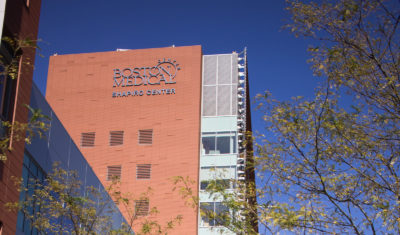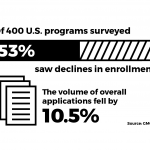
Boston University School of Medicine professor Avrum Spira will lead one of four research teams tasked with investigating ways to detect lung and pancreatic cancers in their early stages as part of a $16.6 million program launched by the non-profit organization Stand Up To Cancer.
As part of the program, Spira, the director of the BU-Boston Medical Center Cancer Center, said he will lead the Dream Team — a coalition including five other institutions — to put forward a four-year proposal with the goal of finding lung cancer before it begins.
Spira said one of the goals is to find new ways to understand how cancer develops in the lungs, which can also lead to new methods of detecting the early stages of lung cancer.
“The short-term goals are to develop new approaches to understand the earliest molecular and cellular change that occurs when the cancer begins to develop,” Spira said. “If we are able to understand this process, then we could develop better tools to identify people who have early stages of lung cancer.”
According to Spira, by developing early detection strategies for lung cancer, the deadliest form of cancer in the United States, his team could potentially stop the cancer from forming and ultimately develop a cure.
“If we could measure the molecules and changes in non-invasive samples in blood, nose then this can tell us if you are on your way to getting cancer then hopefully we can block it,” Spira said. “If we can block it, then we can diagnose it early and cure it.”
Spira said this program is important because it provides an opportunity to change the way doctors approach the treatment of lung cancer, which he says is particularly difficult to treat.
“It is important because right now the way we treat most of lung cancer patients is that we wait until the disease has developed and then we treat them,” Spira explained. “The whole idea of this research program and funding is … to begin to develop approaches that intercept to stop the cancer and stop the disease before it takes a toll on the patient.”
Spira added that his team also hopes to find a new drug to give to “people that are on their way to getting lung cancer in order to prevent it.”
Jane Rubinstein, senior vice president of communications for Stand Up To Cancer, wrote in an email that the nonprofit decided to collaborate with BU researchers because “they brought together wonderful teams of multi-disciplinary researchers from multiple institutions, offering the most robust and rigorous projects with great potential to benefit patients.”
Rubinstein explained that Stand Up To Cancer intentionally provided a very substantial amount of money to researchers in order for them to continue their research without having to worry about funding, which in turn will allow researchers to collaborate with others in the field.
“A core operating practice of Stand Up To Cancer, is to provide … a significant grant award that will allow those scientists to focus on solving that question in cancer research, without having to stop and apply for multiple grants to aggregate funding,” Rubinstein wrote. “This funding model allows researchers such as Dr. Spira a unique opportunity to work with colleagues with whom they have strong relationships — and with new colleagues with whom they may never have had the opportunity to collaborate with before.”
Several BU medical students said they think funding for lung cancer research is particularly important because the disease is difficult to treat.
Tom Tran, a first-year medical student in the School of Medicine, described the program as “positively ambitious.”
“I look forward to new options and possibilities for early halting lung and pancreatic cancers,” Tran said. “I feel a lot of pride and respect for the BU scientists who are always pushing to discover many ways to impact and change the world.”
Tran explained that he is hopeful patients will benefit greatly from this new program because lung and pancreatic cancers “are hard to detect before irreversible symptoms manifest.”
Eesha Desai, a junior on the pre-med track in the Sargent College of Health and Rehabilitation Sciences, said she expects the research conducted as a result of Stand Up To Cancer’s funding to benefit cancer patients.
“Understanding new measures for preventing cancer growth takes both time and high-quality research labs, which will put the spotlight on these cancers through the combined experience of physicians, patients and scientist,” Desai said.
Amareen Dhaliwal, a second-year medical student, said that having a BU researcher leading this program sets the project in the hub of medicine, alongside incredible physicians and scientist.
“The program is targeted towards two very devastating disease burdens in our country,” Dhaliwal said. “The directed funding from Stand Up To Cancer will help us better understand how lung cancer, the most frequent cancer, and pancreatic cancer, one which has severe and poor prognosis, can be treated under BU.”
Dhaliwal explained that research initiatives like the one spurred by Stand Up To Cancer are necessary for early detection and preventing against further escalation of the disease.
“Lung cancer has a poor prognosis and is usually detected later,” Dhaliwal said. “You must have research if you want progress. With this funding, BU will be able to take more steps forward so that the mother, best friend or sister do not have to continue their lives without their companion.”














